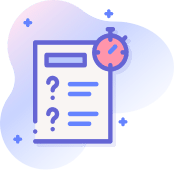The interactive live classes in the ESE IES Online coaching 2022 helps in better understanding and active learning. This also signifies that the doubts of the candidates are resolved at the moment. The study resources available in the ESE online classes are very well designed to clear the ESE IES exam. Give a boost to your score by taking the online course for the ESE IES exam and make sure that you leave no stone unturned to make the most of this opportunity. With increasing competition every year, it has become the need of the hour to upgrade your preparation strategy which is why we bring the best ESE online course.
Candidates can also take the BYJU's Exam Prep ESE IES Online Classroom Program Subscription so that they can avail all the study resources for all the exams that come under the same category. This is a smart initiative by BYJU's Exam Prep to save a lot of time and effort in looking for study materials for different exams discretely.
ESE IES exam is conducted by the Union Public Service Commission. The IES exam happens once a year. IES exam is conducted for branches like civil, mechanical, electrical, and electronics. The IES online coaching is very beneficial for preparing with in-depth knowledge.
ESE IES Online Coaching 2022: Key Highlights
Online Lectures
The IES online classes 2022 are very well organized by the experts. The classes are a great medium through which you can cover the complete syllabus in detail and with an aim of long-term retention in the mind.
Preparation Strategy
The strategy followed in the IES online course is such that you get well prepared to beat the competition and stay ahead. The strategic approach throughout the preparation journey will help in smart work and better results
Track your growth
Keep a check on your growth by taking the multiple types of practice questions, quizzes, mock tests, etc. These study tools will help you analyze your performance from time to time. Along with that, you can refer to a detailed analysis report after every mock test.
Course validity
On enrolling for the ESE online classes you can avail of a free mock test. After making the full payment, you can get access to all the other features of the IES online coaching. The validity of the ESE video lectures will depend on how long you choose to prepare for.
BYJU's Exam Prep Classroom Program Subscription
Preparing for IES exams has become much feasible and organized with BYJU's Exam Prep Classroom Program Subscription. You have the benefit of having access to a wide range of live courses, study material, practice tests, PYSP, etc. created by experts to help you achieve your dream job.
Why choose ESE IES Online Course 2022?
- ESE IES online course strictly follows the latest exam pattern
- The live classes are conducted by the experienced faculties to help you become exam ready in all aspects
- The online course for the IES exam covers the entire syllabus in an organized manner
- The study material encapsulated in the ESE online classes is designed by keeping in mind the perspective to clear the exam.
Benefits of Taking ESE Online Classes
Effective Revision strategies for ESE IES Exam
With the help of ESE online classes, the time to time revision of the topics will lead to more comprehension and clarity in the ESE IES syllabus. This generates more confidence in the candidates and improves their overall performance.
Retention of concepts
Easy remembrance and retention of the topics can be achieved by taking the ESE IES online coaching. Any topic, of variable complexity, can be easily comprehended and understood by taking the ESE video lectures.
Constructive Time-Management
Multiple questions in a time-bound set-up can be practiced to eliminate the extra time taken by the candidates. This promotes the coverage of more topics rather than sticking to just one in a certain amount of time.
IES Syllabus 2022
IES ME Syllabus
IES ME Syllabus for Paper 1
Topics | IES Mechanical Engineering Syllabus |
Fluid Mechanics | Basic Concepts and Properties of Fluids, Manometry, Fluid Statics, Buoyancy, Equations of Motion, Bernoulli’s equation and applications, Viscous flow of incompressible fluids, Laminar and Turbulent flows, Flow through pipes and head losses in pipes. |
Thermodynamics and Heat transfer | Thermodynamic systems and processes; properties of pure substance; Zeroth, First and Second Laws of Thermodynamics; Entropy, Irreversibility, and availability; analysis of thermodynamic cycles related to energy conversion: Rankine, Otto, Diesel and Dual Cycles; ideal and real gases; compressibility factor; Gas mixtures. Modes of heat transfer, Steady and unsteady heat conduction, Thermal resistance, Fins, Free and forced convection, Correlations for convective heat transfer, Radiative heat transfer – Radiation heat transfer co-efficient; boiling and condensation, Heat exchanger performance analysis. |
IC Engines, Refrigeration and Air conditioning | SI and CI Engines, Engine Systems and Components, Performance characteristics, and testing of IC Engines; Fuels; Emissions and Emission Control. Vapour compression refrigeration, Refrigerants, and Working cycles, Compressors, Condensers, Evaporators and Expansion devices, Other types of refrigeration systems like Vapour Absorption, Vapour jet, thermoelectric, and Vortex tube refrigeration. Psychometric properties and processes, Comfort chart, Comfort and industrial air conditioning, Load calculations, and Heat pumps. |
Turbo Machinery | Reciprocating and Rotary pumps, Pelton wheel, Kaplan and Francis Turbines, velocity diagrams, Impulse and Reaction principles, Steam and Gas Turbines, Theory of Jet Propulsion – Pulse jet and Ram Jet Engines, Reciprocating and Rotary Compressors – Theory and Applications |
Power Plant Engineering | Rankine and Brayton cycles with regeneration and reheat, Fuels and their properties, Flue gas analysis, Boilers, steam turbines and other power plant components like condensers, air ejectors, electrostatic precipitators and cooling towers – their theory and design, types and applications |
Renewable Sources of Energy | Plate and focusing collectors on their materials and performance. Solar Thermal Energy Storage, Applications – heating, cooling and Power Generation; Solar Photovoltaic Conversion; Harnessing of Wind Energy, Bio-mass and Tidal Energy – Methods and Applications, Working principles of Fuel Cells. |
IES ME Syllabus for Paper 2
Topics | IES Mechanical Engineering Syllabus |
Engineering Mechanics | Analysis of System of Forces, Friction, Centroid and Centre of Gravity, Dynamics; Stresses and Strains-Compound Stresses and Strains, Bending Moment and Shear Force Diagrams, Theory of Bending Stresses- Slope and deflection-Torsion, Thin and thick Cylinders, Spheres. |
Engineering Materials | Basic Crystallography, Alloys and Phase diagrams, Heat Treatment, Ferrous, and Non-Ferrous Metals, Nonmetallic materials, Basics of Nano-materials, Mechanical Properties and Testing, Corrosion prevention and control |
Mechanisms and Machines | Types of Kinematics Pair, Mobility, Inversions, Kinematic Analysis, Velocity and Acceleration Analysis of Planar Mechanisms, CAMs with uniform acceleration and retardation, cycloidal motion, oscillating followers; Vibrations –Free and forced vibration of undamped and damped SDOF systems, Transmissibility Ratio, Vibration Isolation, Critical Speed of Shafts. Gears – Geometry of tooth profiles, Law of gearing, Involute profile, Interference, Helical, Spiral and Worm Gears, Gear Trains- Simple, compound and Epicyclic; Dynamic Analysis – Slider – crank mechanisms, turning moment computations, balancing of Revolving & Reciprocating masses, Gyroscopes –Effect of Gyroscopic couple on automobiles, ships and aircraft, Governors. |
Design of Machine Elements | Design for static and dynamic loading; failure theories; fatigue strength and the S-N diagram; principles of the design of machine elements such as riveted, welded and bolted joints. Shafts, Spur gears, rolling and sliding contact bearings, Brakes and clutches, flywheels. |
Manufacturing, Industrial and Maintenance Engineering | Metal casting-Metal forming, Metal Joining, Machining and machine tool operations, Limits, fits and tolerances, Metrology and inspection, computer Integrated manufacturing, FMS, Production planning and Control, Inventory control and operations research - CPM-PERT. Failure concepts and characteristics-Reliability, Failure analysis, Machine Vibration, Data acquisition, Fault Detection, Vibration Monitoring, Field Balancing of Rotors, Noise Monitoring, Wear and Debris Analysis, Signature Analysis, NDT Techniques in Condition Monitoring. |
Mechatronics and Robotics | Microprocessors and Microcontrollers: Architecture, programming, I/O, Computer interfacing, Programmable logic controller. Sensors and actuators, Piezoelectric accelerometer, Hall effect sensor, Optical Encoder, Resolver, Inductosyn, Pneumatic and Hydraulic actuators, stepper motor, Control SystemsMathematical modelling of Physical systems, control signals, controllability and observability. Robotics, Robot Classification, Robot Specification, notation; Direct and Inverse Kinematics; Homogeneous Coordinates and Arm Equation of four Axis SCARA Robot |
IES EE Syllabus
IES EE Syllabus for Paper 1
Topics | IES Electrical Engineering Syllabus |
Engineering Mathematics | Matrix theory, Eigen values & Eigen vectors, the system of linear equations, Numerical methods for the solution of non-linear algebraic equations and differential equations, integral calculus, partial derivatives, maxima and minima, Line, Surface and Volume Integrals. Fourier series, linear, non-linear and partial differential equations, initial and boundary value problems, complex variables, Taylor’s and Laurent’s series, residue theorem, probability and statistics fundamentals, Sampling theorem, random variables, Normal and Poisson distributions, correlation and regression analysis. |
Electrical Materials | Electrical Engineering Materials, crystal structures, and defects, ceramic materials, insulating materials, magnetic materials – basics, properties and applications; ferrites, ferromagnetic materials, and components; basics of solid-state physics, conductors; Photo-conductivity; Basics of Nano materials and Superconductors. |
Electric Circuits and Fields | Circuit elements, network graph, KCL, KVL, Node, and Mesh analysis, ideal current and voltage sources, Thevenin’s, Norton’s, Superposition and Maximum Power Transfer theorems, transient response of DC and AC networks, Sinusoidal steady-state analysis, basic filter concepts, two-port networks, three-phase circuits, Magnetically coupled circuits, Gauss Theorem, electric field and potential due to point, line, plane, and spherical charge distributions, Ampere’s and Biot-Savart’s laws; inductance, dielectrics, capacitance; Maxwell’s equations. |
Electrical and Electronic Measurements | Principles of measurement, accuracy, precision, and standards; Bridges and potentiometers; moving coil, moving iron, dynamometer and induction type instruments, measurement of voltage, current, power, energy and power factor, instrument transformers, digital voltmeters and multimeters, phase, time and frequencymeasurement, Q-meters, oscilloscopes, potentiometric recorders, error analysis, Basics of sensors, Transducers, basics of data acquisition systems |
Computer Fundamentals | Number systems, Boolean algebra, arithmetic functions, Basic Architecture, Central Processing Unit, I/O and Memory Organisation; peripheral devices, data representation and programming, basics of Operating system, and networking, virtual memory, file systems; Elements of programming languages, typical examples. |
Basic Electronics Engineering | Basics of Semiconductor diodes and transistors and characteristics, Junction and field-effect transistors (BJT, FET, and MOSFETS), different types of transistor amplifiers, equivalent circuits and frequency response; oscillators and other circuits, feedback amplifiers. |
IES EE Syllabus for Paper 2
Topics | IES Electrical Engineering Syllabus |
Analog and Digital Electronics | Operational amplifiers – characteristics and applications, combinational and sequential logic circuits, multiplexers, multivibrators, sample and hold circuits, A/D and D/A converters, basics of filter circuits and applications, simple active filters; Microprocessor basics- interfaces and applications, basics of linear integrated circuits; Analog communication basics, Modulation, and demodulation, noise and band, transmitters and receivers, signal to noise ratio, digital communication basics, sampling, quantizing, coding, frequency and time domain multiplexing, power line carrier communication systems. |
Systems and Signal Processing | Representation of continuous and discrete-time signals, Shifting and scaling operations, linear, time-invariant and causal systems, Fourier series representation of continuous periodic signals, sampling theorem, Fourier and Laplace transforms, Z transforms, Discrete Fourier transform, FFT, linear convolution, discrete cosine transform, FIR filter, IIR filter, bilinear transformation |
Control Systems | Principles of feedback, transfer function, block diagrams and signal flow graphs, steady-state errors, transforms and their applications; Routh-Hurwitz criterion, Nyquist techniques, Bode plots, root loci, lag, lead and lead-lag compensation, stability analysis, transient and frequency response analysis, state-space model, state transition matrix, controllability and observability, linear state variable feedback, PID and industrial controllers. |
Electrical Machines | Single-phase transformers, three-phase transformers - connections, parallel operation, auto-transformer, energy conversion principles, DC machines - types, windings, generator characteristics, armature reaction and commutation, starting and speed control of motors, Induction motors - principles, types, performance characteristics, starting and speed control, Synchronous machines - performance, regulation, parallel operation of generators, motor starting, characteristics and applications, servo and stepper motors. |
Power Systems | Basic power generation concepts, steam, gas and water turbines, transmission line models and performance, cable performance, insulation, corona, and radio interference, power factor correction, symmetrical components, fault analysis, principles of protection systems, basics of solid-state relays and digital protection; Circuit breakers, Radial and ring-main distribution systems, Matrix representation of power systems, load flow analysis, voltage control and economic operation, System stability concepts, Swing curves and equal area criterion. HVDC transmission and FACTS concepts, Concepts of power system dynamics, distributed generation, solar and wind power, smart grid concepts, environmental implications, fundamentals of power economics. |
Power Electronics and Drives | Semiconductor power diodes, transistors, thyristors, triacs, GTOs, MOSFETs and IGBTs - static characteristics and principles of operation, triggering circuits, phase control rectifiers, bridge converters - fully controlled and half controlled, principles of choppers and inverters, basic concepts of adjustable speed DC and AC drives, DC-DC switched-mode converters, DC-AC switched-mode converters, resonant converters, high-frequency inductors and transformers, power supplies. |
IES Exam Pattern 2022
IES ME Exam Pattern
Subject | Duration | Maximum Marks |
ESE ME Prelims Exam |
Paper-I (General Studies and Engineering Aptitude) | 2 hrs. | 200 |
Paper-II (Mechanical Engineering) | 3 hrs. | 300 |
Total | 5 hrs. | 500 |
ESE ME Mains Exam |
Paper-I (Mechanical Engineering) | 3 hrs. | 300 |
Paper-II (Mechanical Engineering) | 3 hrs. | 300 |
Total | 6 hrs. | 600 marks |
IES EE Exam Pattern
Subject | Duration | Max. Marks |
Category-III Electrical Engineering | | |
Paper-I (General Studies and Engineering Aptitude) | 2 hrs. | 200 |
Paper-II (Electrical Engineering) | 3 hrs | 300 |
Total | | 500 |
IES Exam Highlights 2022
IES/ ESE Full Form | Indian Engineering Services are also known as Engineering Services Exam |
Conducting Body | UPSC (Union Public Service Exam) |
IES Exam Level | National level |
IES/ ESE Official Website | upsc.gov.in |
Application Mode | Online |
Exam Mode | Offline |
No. of vacancies | to be notified |
How to Avail ESE IES Video Course?
- A high internet speed with a 2 MBPS downloads speed.
- A laptop/desktop which supports web browsers.
- Headphones/earphones if necessary
Steps to enroll in IES Exam Online Coaching
- Firstly, visit the official website of BYJU's Exam Prep.
- Now, click on the Courses section.
- Complete the payment procedure by clicking on the ‘Unlock All Courses' option.
Validity of Classroom Program
The validity of your BYJU's Exam Prep Classroom Program will depend on the validity plan selected by you while purchasing the course. The validity of BYJU's Exam Prep Classroom Program will start right after the day of purchase. For Eg: If you buy a yearly BYJU's Exam Prep Classroom Program subscription on 1st Jan 2022, it will be available till 31st Dec 2022. You can check your purchased BYJU's Exam Prep Classroom Program subscription validity anytime from the My Purchases section.
Equipment Required to Access the Online Video Course
All you need is a functional laptop or desktop, preferably one which supports online browsers. A high-speed, efficient internet connection will not cause any disruption during the classes. As per your choice, you need either a speaker system or ear/headphones.













